The Automotive Bearing and Clutch Component Aftermarket is estimated to be valued at USD 6247.7 million in 2025 and is projected to reach USD 10080.4 million by 2035, registering a compound annual growth rate (CAGR) of 4.9% over the forecast period.
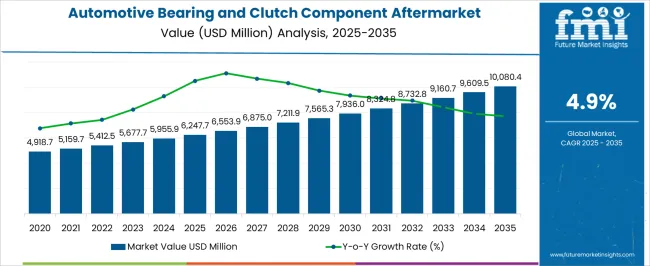
| Metric | Value |
|---|---|
| Automotive Bearing and Clutch Component Aftermarket Estimated Value in (2025 E) | USD 6247.7 million |
| Automotive Bearing and Clutch Component Aftermarket Forecast Value in (2035 F) | USD 10080.4 million |
| Forecast CAGR (2025 to 2035) | 4.9% |
The automotive bearing and clutch component aftermarket is experiencing robust growth, fueled by the rising average age of vehicles, increasing maintenance demand, and the expanding global vehicle fleet. Growth in commercial transportation and rising freight movement have further reinforced aftermarket requirements for durable and high-performance components.
The current market is supported by the strong presence of unorganized and organized players, ensuring wide product availability across global regions. Technological improvements in bearing and clutch materials, along with enhanced manufacturing standards, are enabling longer service life and reduced replacement intervals.
However, increased vehicle complexity and the need for specialized repair tools are influencing distribution strategies. Looking forward, steady demand will be driven by expanding e-commerce channels, cost-conscious vehicle owners, and the continued reliance on aftermarket services for vehicle efficiency and performance.
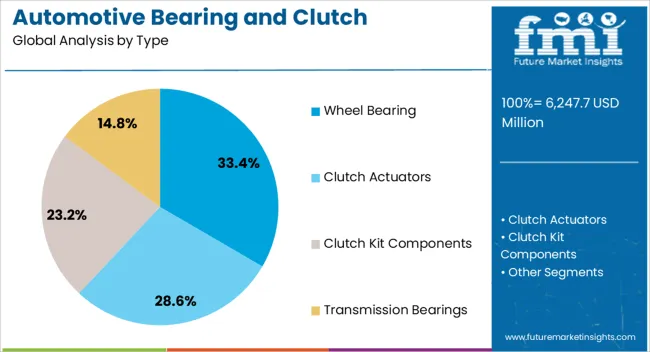
The wheel bearing segment leads the type category, accounting for approximately 33.4% share of the automotive bearing and clutch component aftermarket. Its prominence is attributed to frequent replacement needs due to wear and tear, particularly in vehicles exposed to heavy loads and varied road conditions.
Wheel bearings are critical for ensuring vehicle stability, reduced friction, and improved driving safety, making them a high-demand component in the aftermarket. Rising consumer preference for preventive maintenance and OEM-equivalent parts has reinforced growth.
With continuous innovations in bearing materials and lubrication technologies, this segment is projected to sustain its leadership.
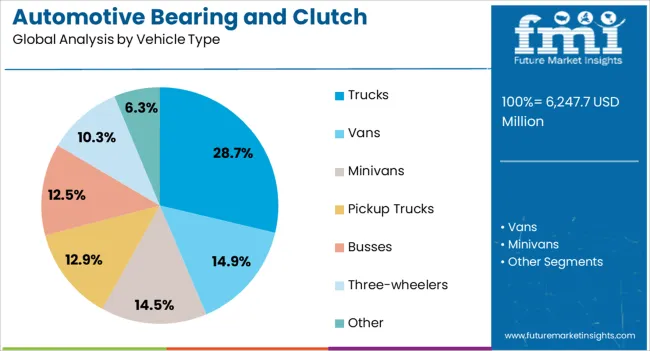
The trucks segment dominates the vehicle type category, contributing approximately 28.7% share. This segment’s leadership is supported by the high replacement frequency of clutch and bearing components in heavy-duty commercial vehicles exposed to extensive daily usage.
The increasing reliance on trucks for logistics, construction, and industrial transportation has accelerated demand in the aftermarket. Growth is also driven by regulatory emphasis on vehicle safety and performance compliance, compelling fleet operators to invest in timely component replacement.
With rising freight activities worldwide, the trucks segment is expected to remain the leading vehicle type in this aftermarket.
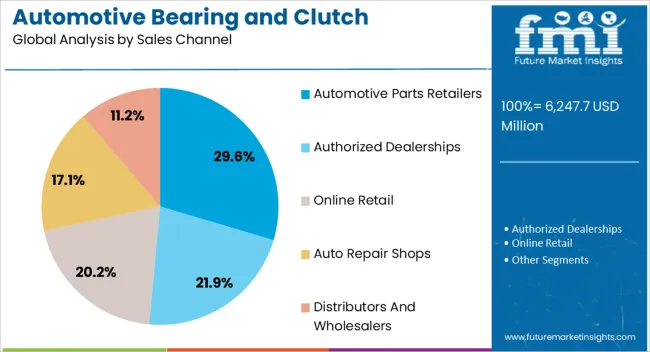
The automotive parts retailers segment leads the sales channel category, representing approximately 29.6% share. This dominance is due to the extensive presence of retailer networks that ensure accessibility to both branded and cost-competitive aftermarket products.
Retailers serve as a vital channel for individual vehicle owners and small workshops seeking immediate replacements without long lead times. Increasing availability of specialized parts, along with promotional offers and bundled services, has further supported this segment’s role.
With expanding retail chains and digitization of distribution networks, this channel is expected to retain its leading position in the aftermarket landscape.
Market to Expand Over 1.6X through 2035
The global automotive bearing and clutch component aftermarket is anticipated to expand over 1.6X through 2035, amid a 4.7% surge in projected CAGR compared to the historical one. This is due to the growing demand for affordable and reliable aftermarket solutions driven by the increasing global vehicle parc, the rising average age of vehicles, and the emphasis on cost-effective maintenance and repair options.
As the automotive industry experiences continuous growth, the need for replacement bearings and clutch components is escalating. This is expected to create lucrative growth prospects for aftermarket automotive bearing and clutch component suppliers.
Other Factors Driving Automotive Bearing and Clutch Component Aftermarket
Automotive Bearing and Clutch Component Aftermarket Trends
North America to Remain at the Epicenter of Growth
As per the latest analysis, North America is expected to dominate the global aftermarket during the forecast period. It will likely account for around 48.5% of the global automotive bearing and clutch component aftermarket share in 2035. This is attributed to the following factors:
Clutch kit components are poised to dominate the global automotive bearing and clutch component aftermarket through 2035. This is primarily due to their comprehensive nature, encompassing various essential elements like the clutch disc, pressure plate, and release bearing. They provide a convenient one-stop solution for replacement needs and simplify the maintenance process for vehicle owners and mechanics alike.
The high wear and tear experienced by clutch components, coupled with a preference for preventive maintenance practices, further drive the significant demand for clutch kits. They are becoming a cost-effective, easy-to-install, and popular choice within the aftermarket. Currently, the target segment holds a dominant value share of 43.8%.
Clutch kit components are poised to dominate the global automotive bearing and clutch component aftermarket through 2035. This is primarily due to their comprehensive nature, encompassing various essential elements like the clutch disc, pressure plate, and release bearing. They provide a convenient one-stop solution for replacement needs and simplify the maintenance process for vehicle owners and mechanics alike.
The high wear and tear experienced by clutch components, coupled with a preference for preventive maintenance practices, further drive the significant demand for clutch kits. They are becoming a cost-effective, easy-to-install, and popular choice within the aftermarket. Currently, the target segment holds a dominant value share of 43.8%.
The automotive bearing and clutch component aftermarket is poised to register steady growth during the assessment period. This market serves as the post-purchase ecosystem for a wide range of automotive parts, such as wheel bearings, transmission bearings, and clutch actuators, which are utilized for vehicle maintenance, repair, and enhancement purposes.
The aftermarket sector provides consumers and businesses with a cost-effective alternative to original equipment manufacturer (OEM) parts, catering to a wide variety of automotive needs. As a result, it is becoming a highly lucrative business globally.
Aftermarket automotive components allow car owners to extend the lifespan of their vehicles and enhance their performance without spending a lot. Growing preference for these aftermarket parts is expected to boost market revenue through 2035.
A notable trend within the automotive bearing and clutch component aftermarket is the increasing demand for specialized parts and accessories catering to off-road and adventure vehicle enthusiasts. This segment seeks unique solutions, such as heavy-duty wheel bearings, rugged clutch kits, and specialized transmission bearing replacements designed to withstand the rigors of off-road terrain.
The trend reflects a growing passion for recreational off-roading, overlanding, and outdoor adventures. As a result, aftermarket manufacturers are investing in robust, off-road-ready components, often incorporating advanced materials and innovative designs.
The digital transformation of the automotive bearing and clutch components aftermarket presents a significant opportunity for growth. E-commerce platforms have become essential in the industry, allowing consumers and businesses to browse and purchase parts online, expanding the market reach.
Digital platforms also allow aftermarket companies to showcase their products, offer detailed information, and provide customer support. Investing in user-friendly e-commerce websites and leveraging digital marketing strategies can help aftermarket businesses tap into a broader customer base, increase brand visibility, and improve the overall customer experience.
The continued expansion of online sales and the integration of digital tools for parts identification and purchase create ample room for growth and convenience in the market. Similarly, customization and catering to niche markets represent a growing opportunity in the automotive bearing and clutch components aftermarket.
Consumers often seek personalized and specialized solutions for their vehicles, whether for aesthetic enhancements, performance upgrades, or unique applications. Aftermarket manufacturers can capitalize on this by offering a wide range of customization options, from personalized accessories to performance-enhancing kits.
Catering to niche markets, such as classic car enthusiasts, off-road adventurers, or electric vehicle owners, can be highly profitable. Specialized components and kits that meet the distinct needs of these market segments can be developed, providing a competitive edge and appealing to a dedicated customer base.
Embracing customization and catering to niche markets can lead to increased sales and brand loyalty in the aftermarket industry. This will bode well for the target market during the assessment period.
Global sales of aftermarket automotive bearings and clutch components grew at a CAGR of 0.2% between 2020 and 2025. Total market revenue reached about USD 5,422.9 million in 2025. In the forecast period, the automotive bearing and clutch component aftermarket is anticipated to expand at a CAGR of 4.9%.
| Historical CAGR (2020 to 2025) | 0.2% |
|---|---|
| Forecast CAGR (2025 to 2035) | 4.9% |
The global aftermarket for automotive bearings and clutch components witnessed sluggish growth between 2020 and 2025. This was mainly due to reduced demand for aftermarket automotive components because of the impact of the COVID-19 pandemic.
Governments across the world imposed strict restrictions on the movement of people and vehicles during the pandemic to curb the spread of the virus. This, in turn, decreased demand for vehicle repair and automotive spare parts, including bearing replacement and clutch system parts.
Future Scope of the Automotive Bearing and Clutch Component Aftermarket
In the assessment period, the global aftermarket is set to rise steadily, reaching a valuation of USD 9,145.2 million by 2035. This is attributable to several factors, including the sustained growth of the global automotive industry, an expanding vehicle parc, and increasing emphasis on cost-effective maintenance solutions.
Consumers and businesses are becoming aware of the economic benefits of aftermarket components, such as clutch release bearings. This is anticipated to propel their demand during the assessment period.
Technological advancements in aftermarket products and a rising trend toward vehicle customization and upgrades will further boost the market. The aftermarket's ability to offer a diverse range of high-quality products, often at competitive prices, coupled with favorable regulatory environments supporting fair competition and product safety, contributes to the positive trajectory.
Increasing Vehicle Ownership and Aging Vehicle Fleet
One of the primary factors driving the growth of the automotive bearing and clutch component aftermarket is the continuously increasing vehicle ownership. Similarly, the aging vehicle fleet will likely elevate aftermarket bearing and clutch component demand.
As more consumers purchase and keep their vehicles for longer periods, the demand for replacement parts such as wheel bearings, clutch actuators, and transmission bearings naturally rises. Older vehicles tend to require more frequent repairs and maintenance, creating a steady and growing market for aftermarket parts.
The trend is further accentuated by consumers' desire to extend the lifespan of their vehicles. Aftermarket parts are becoming crucial solutions for maintaining roadworthy cars and reducing the overall cost of vehicle ownership.
Technological Advancements and Performance Enhancement
Another key driver in the automotive bearing and clutch component aftermarket is the continuous technological advancements and the quest for improved vehicle performance. Modern vehicles are equipped with increasingly sophisticated components, including advanced bearing technologies, clutch actuation systems, and enhanced clutch kits.
As consumers seek better performance, fuel efficiency, and reliability from their vehicles, there is a growing demand for aftermarket parts that offer upgraded features and durability. This driver not only fuels replacement part sales but also opens opportunities for companies to provide innovative and high-performance aftermarket solutions.
Maintenance and Repair Awareness
The increasing awareness of vehicle maintenance and repair is a vital driver in the automotive bearing and clutch component aftermarket. Consumers are becoming more conscious of the need to maintain their vehicles regularly to ensure safety and extend their lifespan, thereby fostering sales growth.
Today, car owners are more inclined to replace worn-out or faulty parts with high-quality aftermarket alternatives. This is not limited to individual vehicle owners but also extends to fleet operators and commercial vehicle owners who prioritize regular maintenance to minimize downtime and ensure the longevity of their vehicles.
Economic Factors and Cost-effective Repair
Economic factors play a significant role in fostering automotive bearing and clutch components aftermarket growth. When economic conditions are challenging, consumers and businesses often opt for cost-effective repairs and maintenance over purchasing new vehicles. This drives the demand for affordable aftermarket parts as they offer a more budget-friendly alternative to original equipment manufacturer (OEM) parts.
The availability of high-quality automotive parts at competitive prices becomes a compelling option for those looking to keep their vehicles operational while minimizing expenses. In times of economic uncertainty, the aftermarket parts industry can experience increased growth as consumers and businesses prioritize cost-effective repair solutions.
Counterfeit and Low-quality Parts
One significant restraint in the automotive bearing and clutch component aftermarket is the proliferation of counterfeit and low-quality parts. Counterfeit parts, often sold at lower prices, pose a significant risk to consumers and the market as a whole. These parts may lack the necessary quality standards, leading to subpar performance and potential safety hazards.
The presence of counterfeit parts can erode trust in the aftermarket sector, making consumers wary of purchasing non-OEM parts. To overcome this challenge, regulatory bodies, and industry stakeholders must work together to enforce quality standards and establish mechanisms to detect and prevent the distribution of counterfeit components. This restraint underscores the importance of maintaining the integrity and reputation of the aftermarket industry.
Technological Complexity and Diagnostic Challenges
The increasing complexity of modern vehicles presents a significant restraint for the automotive bearing and clutch components aftermarket. Many new vehicles are equipped with advanced technology and electronics, making it more challenging for aftermarket mechanics to diagnose and repair issues accurately. This complexity results in a growing reliance on specialized diagnostic tools and expertise, which can be costly and time-consuming.
Several vehicle manufacturers limit access to their diagnostic software and tools, making it difficult for aftermarket service providers to compete effectively. Overcoming this restraint requires investment in training and technology, as well as cooperation between vehicle manufacturers and aftermarket businesses to ensure access to necessary diagnostic resources.
The table below highlights the top nations' automotive bearing and clutch component aftermarket revenue. The United States, China, and India are anticipated to remain top consumers of aftermarket automotive products like automotive bearings and clutch components, with expected valuations of USD 3,647.8 million, USD 1,341.9 million, and USD 503.6 million, respectively, in 2035.
| Countries | Automotive Bearing and Clutch Component Aftermarket Revenue (2035) |
|---|---|
| United States | USD 3,647.8 million |
| China | USD 1,341.9 million |
| India | USD 503.6 million |
| Canada | USD 442.3 million |
| ASEAN | USD 410.8 million |
The table below shows the estimated growth rates of the top three countries. South Africa, Nordics, and Poland are set to record higher CAGRs of 8.0%, 7.9%, and 7.3%, respectively, through 2035.
| Countries | Projected Automotive Bearing and Clutch Components Aftermarket CAGR (2025 to 2035) |
|---|---|
| South Africa | 8.0% |
| NORDICS | 7.9% |
| Poland | 7.3% |
| Turkiye | 7.0% |
| Kingdom of Saudi Arabia | 6.9% |
The United States automotive bearing and clutch component aftermarket size is expected to reach USD 3,647.8 million by 2035. Over the forecast period, demand for aftermarket automotive bearing and clutch components in the United States is poised to rise at 4.0% CAGR, driven by factors like:
A key factor driving the growth of the automotive bearing and clutch component aftermarket in the United States is the relentless pursuit of innovation within the automotive industry. The integration of cutting-edge technologies, such as advanced materials, precision engineering, and smart systems, is revolutionizing the design and functionality of automotive bearings and clutch components.
Manufacturers are increasingly focused on developing products that not only enhance vehicle performance but also address evolving consumer preferences for sustainability, efficiency, and durability. This will likely improve the United States' automotive bearing and clutch component aftermarket share.
The demand for innovative solutions is particularly evident in the shift towards electric and hybrid vehicles, where specialized bearing and clutch components play a pivotal role in ensuring optimal functionality and performance. This intersection of innovation and sustainability is reshaping the aftermarket sector.
Top manufacturers will continue to introduce novel aftermarket products like clutch release bearings. This will help them fulfill the needs of consumers seeking products that meet traditional performance standards and align with modern environmental and technological expectations.
China stands prominently at the forefront of automotive bearing and clutch component aftermarket growth. This is attributable to a combination of factors, including:
One crucial factor contributing to China's leadership is its robust manufacturing capabilities. Similarly, increasing vehicle ownership implies a higher potential for component failures and replacements, driving demand for aftermarket parts like bearings.
China has emerged as a manufacturing powerhouse, producing a vast array of automotive components with a focus on quality and efficiency. This manufacturing prowess supports domestic demand and positions China as a significant exporter of aftermarket products to international markets.
As per the latest analysis, sales of aftermarket automotive bearing and clutch components in China are projected to soar at a CAGR of around 5.0% during the assessment period. Total valuation in the country is anticipated to reach USD 1,341.9 million by 2035.
India's automotive bearing and clutch component aftermarket value is anticipated to total USD 503.6 million by 2035. It will likely exhibit a CAGR of 4.7% during the assessment period, driven by factors like:
The automotive bearing and clutch component aftermarket in India is poised to exhibit steady growth. This is primarily due to the surge in sales of commercial vehicles and the robust expansion of the logistics and transportation sector.
As the nation witnesses increased economic activities and trade, the need for reliable and efficient commercial vehicles becomes paramount. This, in turn, drives the demand for quality automotive bearing and clutch components, as these are essential for ensuring the optimal performance and durability of commercial vehicle fleets.
India's thriving logistics industry, fueled by e-commerce and the growing need for efficient supply chain management, further amplifies the demand for aftermarket solutions. The constant movement of goods across vast geographical areas puts a premium on the reliability and longevity of automotive components.
Manufacturers in India are keenly attuned to these market dynamics, producing aftermarket products that cater to the specific needs of the commercial vehicle and logistics sectors. This will bode well for the market over the forecast period.
The section below shows that the clutch kit components segment dominates the automotive bearing and clutch component aftermarket. It is predicted to expand at a 5.3% CAGR between 2025 and 2035. Based on vehicle type, the vans segment is projected to record a CAGR of 4.5% during the forecast period.
| Top Segment (Product Type) | Clutch Kit Components |
|---|---|
| Predicted CAGR (2025 to 2035) | 5.3% |
As per the latest analysis, the clutch kit components segment is expected to dominate the global market during the forecast period. It will likely exhibit a CAGR of 5.3%, totaling a valuation of USD 4,156.0 million by 2035.
The dominance of clutch kit components is symbolic of their pivotal role in shaping the industry landscape. As a vital element within the automotive transmission system, clutch kits play a central role in ensuring smooth engagement and disengagement of the vehicle's power transmission.
The dominance of clutch kit components can be attributed to their indispensability in maintaining the functionality and performance of a vehicle's clutch system. Comprising components such as the clutch disc, pressure plate, release bearing, and alignment tool, clutch kits are comprehensive solutions that address wear and tear issues commonly associated with clutch assembly.
One key factor contributing to the prominence of clutch kit components is the widespread use of manual transmissions in various vehicles across the globe. As manual transmissions continue to be prevalent, particularly in certain regions and vehicle types, the demand for reliable and efficient clutch systems remains high.
Consequently, the aftermarket for clutch kit components experiences sustained growth as vehicle owners seek replacements and upgrades for optimal clutch performance. Currently, the target segment holds a significant volume share of 43.8%.
| Top Segment (Vehicle Type) | Vans |
|---|---|
| Predicted CAGR (2025 to 2035) | 4.5% |
Based on vehicle type, vans are expected to create lucrative revenue-generative prospects for the automotive bearing and clutch component aftermarket. This is attributable to the widespread usage of vans in several applications.
The significant sales volume in the vans category is a key factor influencing its prominence. Vans, ranging from compact urban delivery vans to larger cargo vans, enjoy substantial popularity in both commercial and personal use.
In the commercial sector, the efficiency and flexibility offered by vans make them indispensable for businesses involved in delivery services, trades, and logistics. The aftermarket for automotive bearing and clutch components becomes crucial for van owners and fleet operators seeking reliable replacements and upgrades to ensure the continuous and optimal performance of their vehicles, given the substantial market presence.
The vans category includes a range of models, from compact urban delivery vans to larger cargo vans, each tailored to specific needs. This diversity contributes to the broad market appeal of van-related aftermarket products, as they cater to a wide array of applications and industries.
The latest automotive bearing and clutch components aftermarket analysis predicts the vans segment will grow at 4.5% CAGR during the forecast period. It is set to attain a valuation of USD 2,447.9 million by 2035.
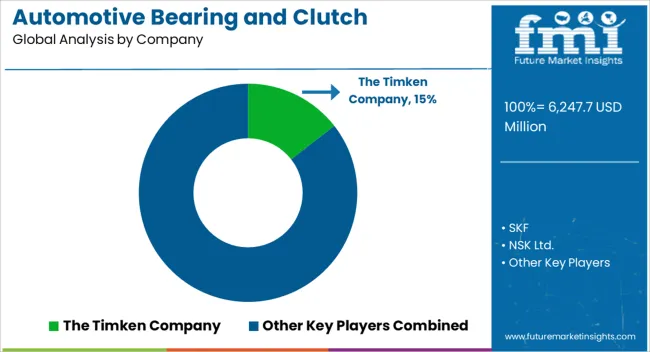
The global automotive bearing and clutch component aftermarket is slightly fragmented, with leading players accounting for about 25% to 30% share. Bosch, ZF Friedrichshafen AG, AISIN, Valeo, Eaton Corporation Plc & Aptiv are the leading manufacturers and suppliers of automotive bearing and clutch components listed in the report.
Key companies are concentrating on developing novel solutions to meet the evolving needs of the automotive sector. For instance, they are developing new light, durable, high-performance automotive bearings for electric vehicles. Many players also employ strategies like mergers, partnerships, distribution agreements, acquisitions, and facility expansions to strengthen their footprint.
Recent Developments in Automotive Bearing and Clutch Component Aftermarket-
| Attribute | Details |
|---|---|
| Base Market Value (2025) | USD 6247.7 million |
| Projected Market Size (2035) | USD 10080.4 million |
| Anticipated Growth Rate (2025 to 2035) | 4.9% CAGR |
| Historical Data | 2020 to 2025 |
| Forecast Period | 2025 to 2035 |
| Quantitative Units | Value (USD Million) and Volume (Units) |
| Report Coverage | Revenue Forecast, Volume Forecast, Company Ranking, Competitive Landscape, Growth Factors, Trends, and Pricing Analysis |
| Market Segments Covered | Product Type, Vehicle Type, Sales Channel, Region |
| Regions Covered | North America; Latin America; Western Europe; Eastern Europe; East Asia; South Asia & Pacific; Middle East & Africa |
| Key Countries Covered | United States, Canada, Mexico, Brazil, Chile, Germany, Italy, France, United Kingdom, Spain, BENELUX, Nordics, Russia, Poland, Hungary, Czech Republic, China, Japan, South Korea, India, ASEAN, Australia and New Zealand, Kingdom of Saudi Arabia, Other GCC, Turkiye, Israel, South Africa, Other African Unions |
| Key Companies Profiled | The Timken Company; SKF; NSK Ltd.; NTN Corporation; Schaeffler Group; Koyo Bearings; BorgWarner Inc.; Valeo; Bosch; Eaton Corporation Plc; Nachi-Fujikoshi; ZF Friedrichshafen AG; Magneti Marelli S.p.A.; AISIN; EXEDY; Aptiv; Minebea Mitsumi Inc. |
The global automotive bearing and clutch component aftermarket is estimated to be valued at USD 6,247.7 million in 2025.
The market size for the automotive bearing and clutch component aftermarket is projected to reach USD 10,080.4 million by 2035.
The automotive bearing and clutch component aftermarket is expected to grow at a 4.9% CAGR between 2025 and 2035.
The key product types in automotive bearing and clutch component aftermarket are wheel bearing, _front wheel bearings, _rear wheel bearings, clutch actuators, _hydraulic, _electromagnetic, _pneumatic, clutch kit components, _friction plates, _pressure plates, _release bearings, _others, transmission bearings, _input shaft bearings, _output shaft bearings, _main shaft bearings, _counter shaft bearings, _needle shaft bearings and differential bearings.
In terms of vehicle type, trucks segment to command 28.7% share in the automotive bearing and clutch component aftermarket in 2025.






Full Research Suite comprises of:
Market outlook & trends analysis
Interviews & case studies
Strategic recommendations
Vendor profiles & capabilities analysis
5-year forecasts
8 regions and 60+ country-level data splits
Market segment data splits
12 months of continuous data updates
DELIVERED AS:
PDF EXCEL ONLINE
Automotive Roof Rails Market Size and Share Forecast Outlook 2025 to 2035
Automotive Active Safety System Market Size and Share Forecast Outlook 2025 to 2035
Automotive Diagnostic Scan Tool Market Size and Share Forecast Outlook 2025 to 2035
Automotive Test Equipment Market Size and Share Forecast Outlook 2025 to 2035
Automotive Dynamic Map Data Market Size and Share Forecast Outlook 2025 to 2035
Automotive Green Tires Market Size and Share Forecast Outlook 2025 to 2035
Automotive E-Tailing Market Size and Share Forecast Outlook 2025 to 2035
Automotive Interior Market Forecast Outlook 2025 to 2035
Automotive Key Market Size and Share Forecast Outlook 2025 to 2035
Automotive Appearance Chemical Market Forecast and Outlook 2025 to 2035
Automotive Seating Market Forecast and Outlook 2025 to 2035
Automotive Domain Control Module Market Forecast and Outlook 2025 to 2035
Automotive Remote Diagnostic Market Forecast and Outlook 2025 to 2035
Automotive-grade Inertial Navigation System Market Size and Share Forecast Outlook 2025 to 2035
Automotive Thin IGBT Module Market Size and Share Forecast Outlook 2025 to 2035
Automotive Hydrogen Leak Detection Sensors Market Size and Share Forecast Outlook 2025 to 2035
Automotive Hybrid IGBTs Market Size and Share Forecast Outlook 2025 to 2035
Automotive Exhaust Extraction Hose Reels Market Size and Share Forecast Outlook 2025 to 2035
Automotive Electroplating Service Market Size and Share Forecast Outlook 2025 to 2035
Automotive Manufacturing Equipment Market Size and Share Forecast Outlook 2025 to 2035

Thank you!
You will receive an email from our Business Development Manager. Please be sure to check your SPAM/JUNK folder too.
Chat With
MaRIA